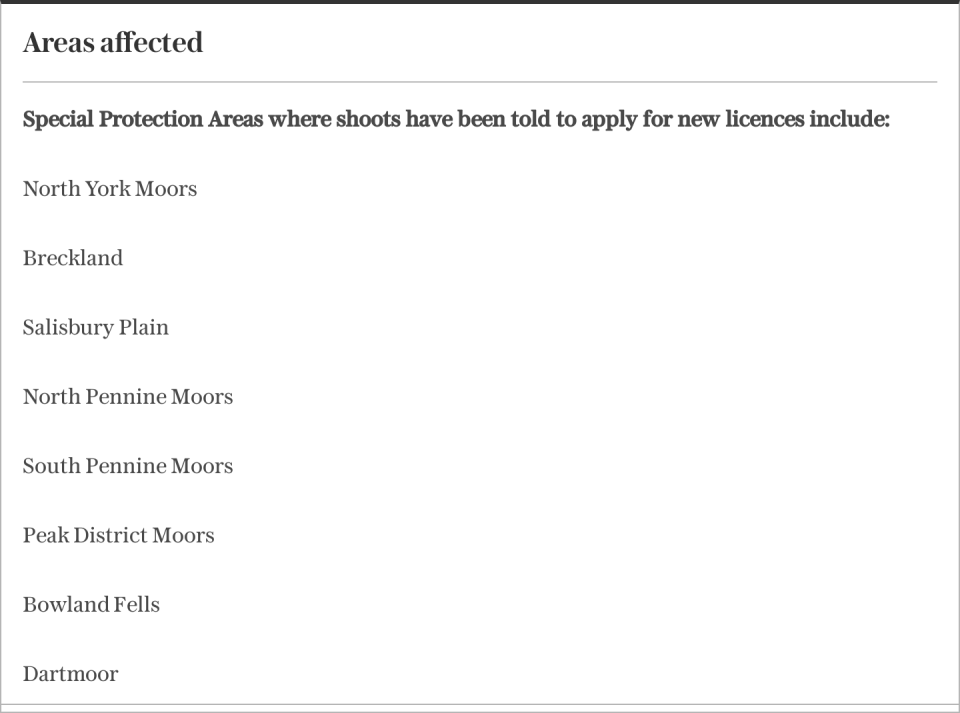Gamekeepers face ruin after last-minute change to licences

Gamekeepers are facing ruin after a last-minute change to licences left more than 200 shoots under threat.
The Government has been accused of a “chaotic” decision to change the rules at the 11th hour, just as partridges and pheasants are about to be released and after tens of thousands of pounds has been spent preparing for the season.
Some gamekeepers have already lost their jobs and others face redundancy as shoots that have been running for more than a hundred years face closure.
The Department for Environment, Food and Rural Affairs has insisted that it made the decision to change the licences for special protection areas for threatened birds based on “robust scientific assessment” to combat the worst outbreak of bird flu on record.
Nigel Neame, secretary of the Bulford and Tidworth Garrison Shoot, was among those this week told that it was being denied a licence to release birds on the protected area on the Salisbury Plain.
It came as a surprise to the shoot, which last year at the peak of avian flu had been given permission to put down extra birds there.
It only learnt about the changes to the licences at the end of last month, at a crucial moment in the rural calendar as it prepared to take delivery of and release the poults.

“There was no consultation, and we had no expectation that the rules would change this year,” Mr Neame told The Telegraph. “If the shoot doesn’t go ahead, we will have to make our keeper redundant.”
If the gamekeepers go, then so do the conservation management and predator control that they bring to the plain.
“This will have a hugely damaging impact on conservation and the threatened bird species,” Mr Neame said.
“The biggest threat to the birds is not the avian flu epidemic, the worst of which was last year, but predators. The curlews are likely to be wiped out by the foxes without the keeper.”
The shoot is working out if it can run a reduced event on the periphery of the plain, but even then, the financial hit means that is potentially only delaying its closure.
“When the news came, I had my keeper on the phone in tears, he has worked so hard for this season,” Mr Neame said.

The Royal Artillery Shoot, which also operates on the Salisbury Plain, is expecting a decision on its licence any day now and is pessimistic about the outcome because of the decision on the Bulford and Tidworth Garrison.
Both have large numbers of ex-military among their members who see the shoot as a community that could be lost overnight.
Ian Bell, a member of the Royal Artillery Shoot who is also chief executive of the British Association for Shooting and Conservation (BASC), said: “We have to make a decision about whether the Royal Artillery will fold after running for almost 100 years.
“This change is affecting businesses, livelihoods and is impacting people’s wellbeing. Many shoots will have to close by the end of the week if they cannot get a licence.
“There is a simple solution – Defra should reverse the change that was made without consultation and reinstate the licences from last year.”
Those expecting delivery of the poults are also trapped in a legal minefield. Most cannot house thousands of birds safely, they cannot release them, but they are also not allowed to cull them.
Legal process could take months
BASC is preparing legal action against Defra, saying the decision was reached without evidence that it would help reduce avian flu and without consultation.
But the legal process would take months, by which time many of the shoots in Special Protection Areas (SPA) will have folded, including one run by Steven Musk.
Mr Musk knows fellow gamekeepers who have already lost their jobs and if his licence on the Breckland in Norfolk is not granted he too will face redundancy.
“We followed all the extra restrictions that the Government put in place in 2021 on the number of birds we could release on an SPA and in the 500m buffer zone and we thought it was done, but now they have decided to move the goal posts again without any warning and whilst avian flu is declining,” he said.
“Where we are in East Anglia was one of the worst areas for bird flu last year, but we saw no ill effects in our game. We saw dead geese and dead seagulls, but it didn’t impact the pheasants.
“The shoot has been running for more than 100 years and if they refuse a licence, it will be the death of us, and most probably the bird species the SPA is designated to protect. We have already spent thousands preparing.”
A Defra spokesman said: “We are currently experiencing the worst global outbreak of avian influenza on record and are taking all necessary steps to mitigate the impact and spread of the disease.
“Following a robust scientific assessment, we are having to limit the release of gamebirds in areas of conservation concern in an effort to reduce the impact of this insidious disease. We will review this change, alongside all available evidence, and modify the licence should the risk change.”

 Yahoo News
Yahoo News 
